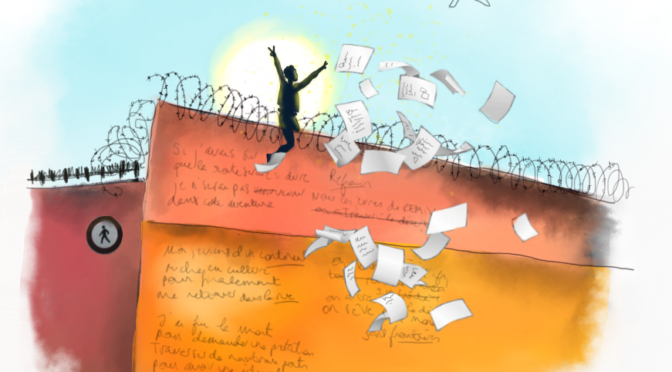Parallel workshops
-
Workshop in French: Professionals working with Unaccompanied Children, difficulties, outcomes and paradoxes.
In the French workshop, moderated by Alexandre Le Clève, professionals from various disciplines confronted their practices and underlined the complementarity of their approaches to build an efficient network around Unaccompanied children.
First, Claire Poulain (Judge, France) explained the role of the guardianship judge in France. She was followed by Sylvie Dutertre (Psychologist, France) who presented an original system of psychological follow-up taking into account the specificity of this public. Wassim El Golli (PhD candidate, EHESS, France) introduced the notion of relation of power between practitioners and Unaccompanied children, but also among children. Sophie Laurant (InfoMIE coordinator, France) presented the “plateforme InfoMIE”, a complete tool for professionals, used as a network, agenda and source of information. Finally, Bernard Séguier (Trainer, AIFRISS, France) described a training tool (“référentiel de competences”), presenting all the aspects that professionals face while working with Unaccompanied children.
-
Workshop in English: Unaccompanied Children’s situation and treatment in various European contexts.
The English workshop, moderated by Marie Diop, presented further situations, abuse and practices in many European countries.
Alice Farmer (Children Right’s Researcher, Human Rights Watch Switzerland) presented abuse documented in Greece, Turkey, Ukraine, France, Malta, and Italy. Then, Rebecca O’Donnell(Senior Policy Advisor, Save the Children EU Office) gave an overview of the European approach and its deficiencies. Olga Byrne (Consultant, Vera Institute of Justice, US) focused on Germany, where children above 16 face discrimination, and the Netherlands, where non asylum seekers are also discriminated. Kristina Gustafsson (Ph.D, Halmstad University, Sweden) discussed the Swedish legislation and reception system for Unaccompanied children, as well as the lack of theoretical knowledge of many practitioners. Finally, Viviana Valastro (Children on the Move Project Coordinator, Save the Children Italy) focused on Unaccompanied and separated children arriving in Italy by sea and existing protection problems.
-
Workshop in Spanish: Unaccompanied Children without protection in Spain
The Spanish workshop, moderated by Lluis Peris and Juan Manuel López Ulla gave an overview of the situation of Unaccompanied childre in Spain through presentations about various regions.
Elisabet Marco Arocas (Lecturer, University of Valencia, Spain) insisted on the effects of the current political, social and economic environment on the treatment of Unaccompanied Children living in the region of Valencia. Núria Empez Vidal (PhD candidate, University of Barcelona) presented cases of children who either face difficulties to be granted institutional protection or remain invisible, in the region of Catalonia. Antonio Jiménez (Lecturer, University of Jaen, Spain) drew attention to a program of training designed by street educators to better understand and support the integration of Unaccompanied children. Loira Manzani & Mikel Mazkarian (SOS Arrazakeria Gipuzkoa, Spain) proposed an analysis on the social, economic and legal situation of unaccompanied children in the Basque region, that suffer from the economic crisis and the hardening of immigration laws. Chabier Gimeno Monterde (PhD candidate, University of Zaragoza, Spain) underlined the variety of profiles in Aragon and the problems faced when they become of age (illegal immigrant). Finally, José David Gutiérrez Sánchez (Educator, Spain) described the context in the region of Madrid through interviews of gypsies.

